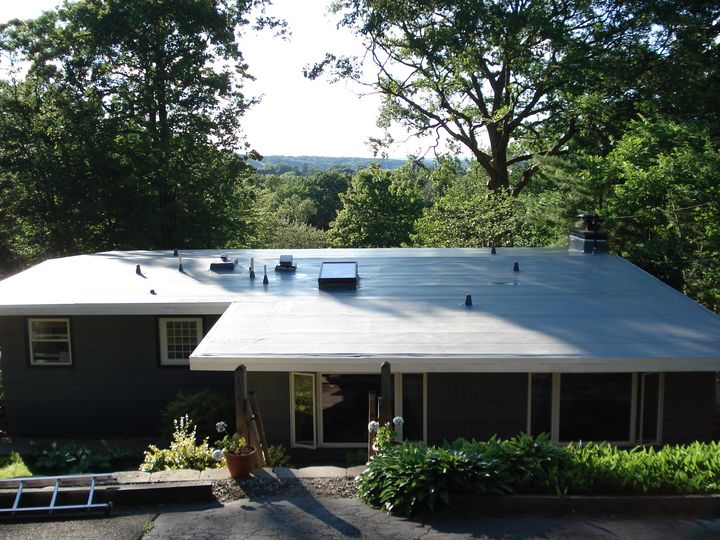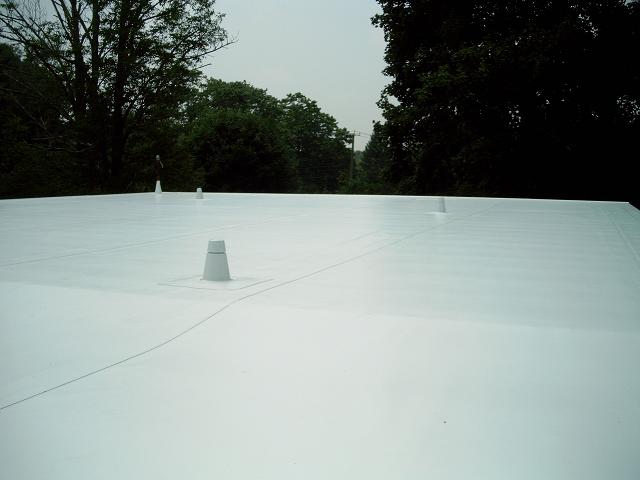PVC, technically known as Polyvinyl Chloride is really vinyl roofing, though is routinely referenced as PVC roof.
PVC competes with TPO and EPDM in the synthetic roof membrane arena, and indirectly with all other roofing materials including BUR, modified bitumen, and structural standing seam roofs designed for lower sloped roofs.
Membrane roofs are usually applied to flat or low-slope roofs but using a single-ply membrane on a sloped roof is also possible and common on roofs with slopes between 1:12 and 3:12.
Why not just use traditional roofing materials (asphalt shingles or other tiles) on a low sloped roof? Because they are very likely to leak unless a minimum specified slope for shingles or tiles has been met.
When used with a slope, the overlap of those materials is designed to shed water away from the roof deck. Whereas flat roofs have only a slight pitch, and any standing, or pooling water, could lead to immediate leaks and rotting soon thereafter.
PVC membrane is a kind of roofing material that can withstand pooling or standing water — puddles of water that accumulate on roofs with low slopes.
Cost
Of the three primary membrane roof types, PVC is the most expensive. EPDM is the least costly option, and TPO is somewhere in the middle.
TPO allegedly offers the benefits of both the other types, yet that material keeps undergoing formula changes, and so compared to PVC and EPDM is considered less reliable, particularly when it comes to warranties.
Prices for residential installs can vary greatly. A roofer is likely to quote differently than a professional PVC installer, probably less, but also likely to not have the proper tools. A fair range is between $8.50 and $14.50 per square foot or $850 to $1,450 per square, depending on the project complexity and location, when installed by a PVC expert.
For a typical 1,200 square foot flat roof, you can expect a total average cost range between $10,200 and $17,400 for a new PVC roof mechanically attached to a roof deck. The cost includes all the necessary materials and supplies, professional installation, building permits, and installation warranty.
 Asphalt Shingles
Asphalt Shingles
$8,500 Average Cost |
 Metal Roof
Metal Roof
$15,500 Average Cost |
 Flat Roof Membrane
Flat Roof Membrane
$11,500 Average Cost |
|
|
||
In terms of value, durability, and ROI, PVC is arguably the best, or longest lasting of the three. EPDM will go 7 to 15 years before needing replacing or re-coating.
TPO is thought to go for as long as PVC, but that information is either suspect or unknown for sure just yet.
PVC has been in the field for decades and unlike TPO isn’t constantly undergoing changes to the formula to address performance issues. Warranties are usually ‘lifetime’ and with proper installation, it ought to retain solid performance for 30 years or more.
The primary factors that determine the cost of installing a PVC roof are:
- total coverage area, measured in square feet. For flat roofs, this must include parapets walls and overhangs (which can add 200 to 300 sq.ft.)
- quality of the installer, which is true with any roofing job, but PVC requires special skills and appropriate tools
- thickness of the material (see Options below)
- whether a tear off the previous roof material is needed
- insulation material
- slope or pitch of the roof
- anything else about the roof’s features, like the number of drainpipes, items that penetrate the roof and need flashing or extra attention
Metal
Flat
$15,500
$11,500
Understanding PVC Options
PVC material is purchased in rolls that are anywhere from 6 to 12 feet wide. Usually when people first consider PVC roofing, they think pipe, but those are not the rolls, nor the exact type of material used for roofing.
When unrolled on a roof, it forms a membrane, that is single-ply, and is rather flexible. To obtain flexibility, the material has additives.
Over time, these additives can break down due to UV rays, but that usually takes decades (20+ years). Whereas TPO is naturally flexible, PVC is not, but can be engineered to be just as flexible and light as TPO.
Between each sheet on the roof are seams, but like TPO, the seams are rectified via air or heat welding. And like TPO, this creates a monolithic roof, that makes it a waterproof barrier on the upper most layer of the home. See this YouTube video as an example of how heat welding works.
The welding gun or a self-rolling guided robot (for larger jobs) is one piece of special equipment that a typical roofing contractor may find unnecessary to purchase if only doing a couple such jobs a year. So, they may forgo this process and overlap seams with glue as the way to obtain a tight seal, which leads to less than 20 years of solid performance.
Attaching PVC rolls to the roof occurs in one of three ways. Most common is mechanically attaching via special metal plates placed over the membrane (in between the seams — before they are welded together) and secured with manufacturer-approved screws.
The second most common installation method is via gluing or what is usually called the fully adhered method. And finally, is the ballasted option where river rocks or ballasts are strategically situated to hold it in place.
White is the most common color for vinyl roofing, but not the only. Manufacturers can blend any color in, and thus throughout, the material, so with PVC roofing there are numerous color options.
The white and slick surface of PVC makes it fit in with a true cool roof that will reflect a high amount of UV rays, and lead to much cooler roof surface temperatures, and hence significantly less heat transferred indoors on hot summer days.
PVC sheets are produced by spreading the vinyl material, which are typically are reinforced with polyester or glass-fiber mats.
Overall, PVC membranes will have a thickness between 45 and 80 millimeters. 50-mil membrane tends to be the norm for residential purpose, but is really a builder preference, or can be made higher by homeowner request and willing to pay for added thickness.
PVC roofs have a minimum breaking point of 300 pounds per inch, which makes for above average durability.
One caveat — PVC is incompatible with asphalt-based products.
If installed anywhere near an asphalt based product like composition shingles, a separator sheet must be in place to keep it away from the asphalt. — This is one instance where a TPO membrane would be a more suitable alternative.
Advantages of a PVC Roof
- proven track record, longer warranties
- achieves cool roof status, leading to energy efficiency
- multiple color options
- highly durable, puncture and tear resistant
- resists water dampness, algae or fungi build up, and animal fats (from kitchen vents)
- can withstand high winds / hurricanes
- fire resistant, is non-combustible
- little to no ongoing maintenance
Disadvantages
- more expensive than TPO and EPDM roofing
- takes special expertise to properly install and achieve solid performance
- the additives that aid in flexibility can break down and pose problems after 20 or so years
- less eco-friendly than TPO, more eco-friendly than EPDM, it can be recycled with other PVC materials
Need a Pro? Check out Prices from Local Roofers:
Enter your zip code:
Is PVC Membrane a Viable Option for Residential Roofs?
Yes, PVC membrane is a viable option for residential roofs. It is a type of single-ply roofing material made from polyvinyl chloride (PVC) and is known for its durability, energy efficiency, and resistance to weather and environmental elements.
PVC membrane roofs can last up to 30 years or more with proper installation and maintenance. They are also lightweight, making them a good option for roofs that cannot support heavier roofing materials. PVC membrane roofs are available in a variety of colors (See IBRoof color options here) and can be customized to match the design and style of your home.
Additionally, they offer good resistance to water and UV rays, making them a good option for areas with high rainfall or intense sunlight. It’s important to work with an experienced and reputable roofing contractor who is familiar with the installation process to ensure proper installation and maximum longevity. Overall, PVC membrane is a durable and cost-effective option for residential roofs.

 See what local pros charge
See what local pros charge
